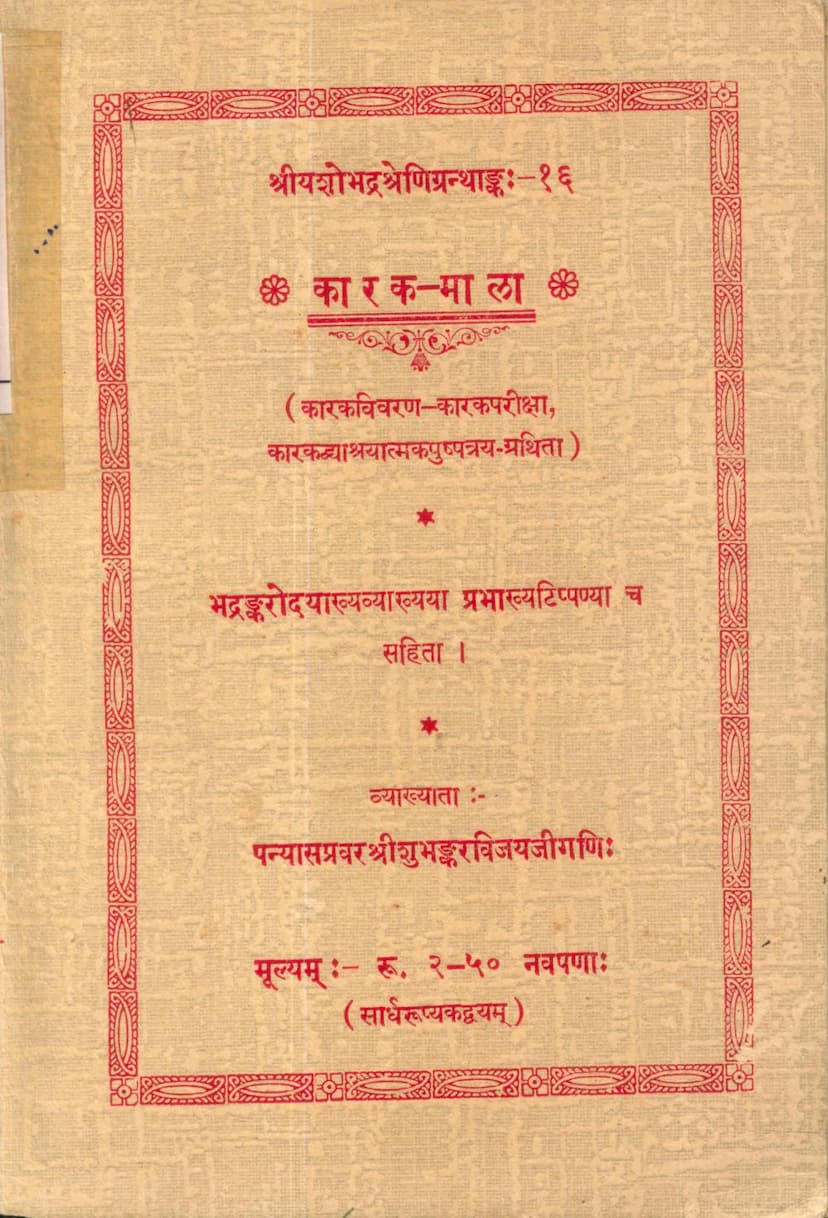Karakmala
Added to library: September 2, 2025
Loading image...

Summary
The book "Karakmala" by Shubhankarvijay and Suryodayvijay, published by Lakshmichand Kunvarji Nagda, is a comprehensive Jain text focused on the grammatical concept of Karakas (case relations) within Sanskrit grammar.
Here's a breakdown of its content and purpose:
Core Content:
- Karakavivarana (Description of Karakas): This section likely provides a detailed explanation of the six fundamental Karakas (primary case relationships) in Sanskrit grammar:
- Kartri (Nominative - the doer)
- Karma (Accusative - the object)
- Karana (Instrumental - the means)
- Sampradana (Dative - the recipient)
- Apādāna (Ablative - the source of separation)
- Adhikarana (Locative - the location) It also includes the Sambandha (Genitive - possession/relation) and its treatment within Karakas.
- Karakapariksha (Examination of Karakas): This section likely involves an analytical study of the Karakas, possibly presenting different viewpoints, resolving doubts, and critically examining their application.
- Karakatvashrayapushpatrayagranthita (Collection of three works based on Karaka dependency): This suggests that the "Karakmala" is a compilation of three distinct but related treatises on Karakas, brought together for a more complete understanding.
Commentaries and Features:
- Bhadrankarodaya by Shubhankarvijay: This is the primary commentary on the text. Shubhankarvijay, a disciple of Yashobhadra vijay, is known for his insightful and clear explanations.
- Prabha by Suryodayvijay: This is a sub-commentary or annotation on "Bhadrankarodaya" by Suryoday vijay, also a disciple of Yashobhadra vijay. It likely clarifies difficult passages, provides alternate readings, and further elucidates the concepts.
- Inclusion of other works: The introduction mentions that the compilation includes relevant sections from:
- 'Karakavivarana' by Pandit Amchandra (Suri)
- 'Karakapariksha' by Mahopadhyaya Pashupati
- 'Karakādhikara' from Shri Hemchandracharya's Vyāshrayamahākāvya.
Purpose and Significance:
- Comprehensive understanding of Karakas: The book aims to provide a thorough and accessible understanding of the complex Karakas, which are crucial for comprehending Sanskrit sentence structure and meaning.
- Addressing the need for a compiled work: The publisher's note and editorial highlight the necessity of a consolidated text on Karakas for students and enthusiasts, as individual works or commentaries might not cover all aspects or resolve all doubts.
- Aid for grammatical learners: The text is considered highly useful for students of Sanskrit grammar and those aspiring to learn it.
- Praise for the commentaries: The commentaries by Shubhankarvijay and Suryodayvijay are highly regarded for their clarity, scholarship, and ability to illuminate the subject matter. The editorial praises the commentator's effort in elucidating complex points and resolving textual variations.
- Foundation in Jain tradition: While dealing with Sanskrit grammar, the text is presented within the Jain tradition, highlighting the importance of grammar for understanding religious and philosophical texts.
Key Themes and Contributions:
- Grammatical Rigor: The text delves into the nuances of Sanskrit grammar, particularly the Karakas, with a focus on accurate interpretation and application.
- Scholarly Compilation: It brings together seminal works on the topic, offering a comparative perspective and a richer understanding.
- Clarity through Commentaries: The detailed commentaries ensure that the complex subject matter is made accessible to a wider audience of learners.
- Preservation and Dissemination: The publication serves to preserve and disseminate valuable Jain grammatical literature.
In essence, "Karakmala" is a scholarly work that aims to demystify the concept of Karakas in Sanskrit grammar through a compilation of key texts and insightful commentaries, making it an invaluable resource for anyone studying Sanskrit within the Jain intellectual tradition.